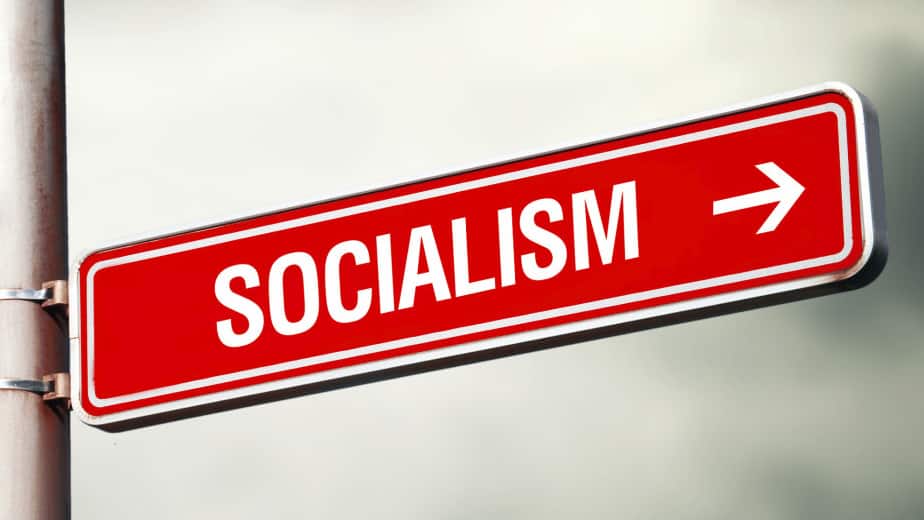A new Gallup poll reveals that 57 percent of Democratic voters and those leaning Democrat have a favorable view of Socialism, whereas only 47 percent have a positive view of Capitalism. This helps to explain why, according to the New York Times, membership in the Democratic Socialists of America (DSA) has grown sevenfold to 35,000 over the last two years. Moreover, the 2016 presidential candidacy of Bernie Sanders is believed to have encouraged other Socialists to run for office, including Alexandria Ocasio-Cortez for Congress, and Cynthia Nixon for Governor of New York State.
Ocasio-Cortez’ platform includes “Medicare for all,” “A Federal Jobs Guarantee,” “ Housing as a Human Right,” and “Trade School for All,”; Cynthia Nixon’s includes “Single Payer Health Care,” “Reproductive Freedom,” “Schools Not Jails,” “Immigrant Rights,” and “Legalizing Marijuana.” Both candidates believe that the Immigration and Customs Enforcement Agency (ICE) should be abolished, with Nixon labeling it a “terrorist organization.”
The new popularity of Socialism has not occurred by accident, nor by a groundswell of belief inspired by independent thought. Rather, it has been planned and promoted by a cadre of true believers. Their activities and goals are expressed in the 2016 DSA document called Resistance Rising: Socialist Strategy in the Age of Political Revolution.
Here is a paraphrase of its message:
In the 1970s, “economic elites” pursued “neoliberalism” by cutting taxes for the rich and funding for social services. Efforts to change this system failed until Bernie Sanders’ socialistic ideas galvanized public opinion in 2016 and sparked a new generation to challenge “capitalism, racism, sexism, xenophobia and other forms of oppression” through protests such as Occupy and Black Lives Matter, which gave hope to the democratic socialist movement that helps “the working class” in their “struggles against the capitalist class.”
DSA intends to “defend a woman’s right to abortion,” . . .”confront gender inequities” and “military adventures,” “win citizenship for . . . immigrants,” and “make democratic socialist politics a force to be reckoned with” in small and large communities. This program of “Democratic Socialism,” it is hoped, will produce “management of all businesses” by the workers in “strategically important sectors of the economy” and serve “the public good, rather than shareholder value.“
Other stated goals are to “provide to everyone on demand, free of charge,” “health care, child care, education (from K through college) shelter and transportation” as well as “universal basic income regardless of the person’s employment status” and a “gradually reduced” work week. Also, to abolish the U.S. Senate, nationalize “strategic industries” such as banking and auto, and use “public resources to develop a genuinely free press and a democratically administered mass media.” Such programs will be paid for by “a truly progressive tax system that makes the wealthy and corporations pay their fair share of government revenue.”
The group admits that their success would not result in utopia, yet believes that “instead of war, there would be peace; instead of competition, cooperation; instead of exploitation, equality; instead of pollution, sustainability and instead of domination, freedom.”
All of these goals, the group cautions, will require the efforts of “radicalized workers,” “workplace organizers [who] are socialists,” and “community organiz[ers],” as well as “militancy among rank-and-file workers,” and the cultivation of “progressive coalitions capable of wielding political power at all levels.”
The strongest appeal of the message is to young people who have been taught and encouraged to blame specific groups, notably conservative white “privileged” men, including not just those living among us and generally in charge of our country and culture, but also those long departed, notably the Founding Fathers.
Political observers do not expect this socialist renewal to achieve much more than modest success in a few newsworthy but inconsequential state and local contests. The commentators may be correct. But the outcome they expect is by no means assured. Historically, seemingly inconsequential movements have at times been surprisingly successful. In the case of the socialist resurgence, two factors could weigh more heavily than prognosticators anticipate.
One factor is the Democratic Party’s apparent determination to run against President Trump rather than for something, such as a thoughtfully conceived platform, both this year and in 2020. This could make socialist candidates more attractive to Democratic voters than they would otherwise be. After all, the socialists’ promise of bigger government is not only familiar to those voters but cleverly magnified.
The second factor is the apparent similarity between socialist and Christian messages. Socialists claim solidarity with the working class, poor, disenfranchised, exploited, downtrodden, oppressed, and abandoned. They claim, as well, to honor human dignity, the public good, and social and economic justice. Such claims resonate with Catholics and other Christians because they mirror Scripture from the command to“bring good news to the afflicted . . . bind up the brokenhearted . . . and proclaim liberty to captives” (Isaiah 61:1) to the warning about ignoring one’s brother in need (1 John 3:17), and to Jesus’ teaching, “to the extent that you did it to one of these brothers of Mine, even the least of them, you did it to Me.” (Matt 25: 40) They also reflect the doctrinal emphases that flow from such Scripture passages, notably the Church’s “preferential option for the poor.” (The socialist claims have an especially strong connection with Liberation Theology, which blends theology with Marxist/Leninist economics.)
Despite the apparent similarity between the messages, however, there are significant differences. In fact, Catholic theology offers strong arguments against Socialism, and they are supported by philosophical and economic analyses. Part 2 will examine the case against Socialism.
Copyright © 2018 by Vincent Ryan Ruggiero. All rights reserved








